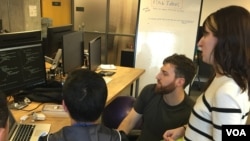If you're thinking about learning a language, you might want to think beyond English or Mandarin and consider Java or Python. If you're not familiar, these last two are the most popular coding languages, and they're likely responsible for a newsfeed that informs you, an e-message that touches you, or an app that entertains you.
And knowing a coding language can make what goes on inside of your phone and computer easier to understand and potentially more fun. That’s why coding bootcamps are popping up all over the United States to train a new generation of technological linguists.
That's what brought Galen Cook to Dev Bootcamp (DBC). Seeking a change in her life, the Hawaii resident can already rattle off a list of coding languages she has mastered.
"I have learned Ruby; I’ve learned JavaScript, and J-query, and Ajax," she said. "I can build programs that run on the terminal, which is the Command line of the black box that 90% of computer users never open on their computer. It’s what runs what’s going on underneath."
Developing Developers
DBC bills itself as the nation's first short-term intensive coding school.
Founded in San Francisco in 2012 by Shereef Bishay, it started after he taught a friend how to code and realized it would be more fun to share his programming knowledge with an entire group. An initial online posting immediately garnered 200 applicants, and the rigorous, immersive web development training program was born.
The program promises to take beginners and make them job-ready in just 19 weeks. After 9 weeks of working remotely from their homes, students come to a Dev Bootcamp campus in Chicago, New York or San Francisco, for 9 weeks of intensive training. That's followed by one week of career preparation, after which graduates are ready to hit the job market.
For Cook, DBC offers a unique teaching environment where “they’re trying to teach you how to go about gaining the knowledge that you need. And a big part of that is embracing confusion and being okay with not knowing everything.”
For Cook's bootcamp colleague, Lisa Swanson, 53 and divorced after 21 years of marriage, being older could be "a challenge" in getting a job.
“I might not be marketable to 100% of the companies out there, but I feel that when I walk in there with a confidence that says, ‘Look, this is who I am and this is what I can bring to the table,’ I feel that level of confidence has been given to me by DBC," she said. "With that I know I’m going to find a job. Somewhere, somehow, somebody’s going to like me.”
About 450 students attend DBC annually. About a third are women, and nearly half are ethnic minorities. In hopes of increasing those numbers, DBC offers partial scholarships to women and minorities for its $13,500 tuition, a price well above the annual cost for a year at a public college.
Hands-on, Collegial Education
DBC's educational philosophy is as expansive as its San Francisco campus, which takes up an entire floor of a downtown office building. With computers everywhere, the space is divided into open classrooms, along with a yoga room, nap room and a kitchen. Students code on erasable white walls and sit on comfortable chairs, beanbags or one of the many couches.
The open space is where games such as Hacky Sack spontaneously erupt.
DBC president Jon Stowe says the holistic approach is summed by three pillars: kindness, integrity, and whole self.
“This is a place of learning and we expect everyone to make mistakes," he explained. "So, [we ask] that you don’t shrink from your mistakes or that you try to hide them, that you’re understanding of yourself, kind to yourself, if you will. And, also, kind to others who may make mistakes."
Stowe says the students are paired off and learn by sharing knowledge.
Anne Spalding, who was a tenured computer science professor at Colorado Mesa University before signing on as a DBC instructor, says the team concept expands throughout training as the questions get more complicated.
"The first person you ask is your pair; the second person you ask is the pair across the aisle from you," she explained. "When there’s five or six of you together, then find a teacher. Because you 5 or 6 solving it yourselves is going to be way more effective than asking us to come in. But when you get to that point, and you ask a teacher to come in, it's really an interesting discussion."
The last week of the bootcamp is devoted to career preparation, and Stowe says about 90% of DBC’s graduates land jobs as junior web developers and the high salaries that go along with that position.
“A lot of the companies that we are placing our graduates into have traditionally gone overseas to either secure workers whom they would bring in under visas or to establish development teams in an off-shore model," he said. "We’d rather have them hiring our graduates, and that’s the opportunity that we see.”
Stowe says the future for Dev Bootcamp is to constantly expand its curriculum to keep up with the fast-changing world of technology.




